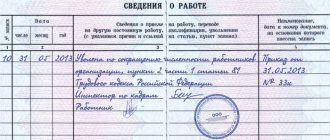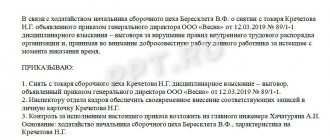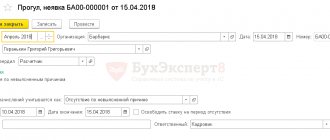Home / Labor Law / Responsibility / Disciplinary
Back
Published: 06/02/2016
Reading time: 9 min
0
7857
Absenteeism is a gross violation of labor discipline, for which the employer has the right to take disciplinary action against the employee .
Moreover, depending on the decision of management, this can be either a reprimand or a reprimand, or a more severe measure - dismissal. It is worth considering in more detail the features and conditions of application of each type of punishment, as well as situations in which it is better to choose one or another measure.
- General conditions for applying punishment The employee actually committed absenteeism
- An employer can prove that an employee committed a violation
General conditions for the application of punishment
The legal application of punishment is possible only if two groups of conditions are simultaneously met:
The employee actually committed absenteeism
This offense means such a lack of
worker at the workplace:
- continuously for more than four hours;
- without a valid reason (the decision as to whether the reason is considered valid is usually made by the employer himself);
- absence from the workplace, which is specified in the job description or in another local document of the enterprise.
If any of these conditions are not met, the employee’s violation is not considered absenteeism, and therefore no punishment can be applied for it.
An employer can prove that an employee committed a violation
In particular, he followed the established procedure for recording absenteeism: he drew up an appropriate act, wrote a memo, attracted witnesses, and demanded a written explanation from the violator.
If all these conditions are met, then the employer has the right (the right, but not the obligation) to apply disciplinary action to the employee. In accordance with Art. 192 of the Labor Code of the Russian Federation, this could be a reprimand, reprimand or dismissal.
Concept of fine
It should be understood that the definition of “fine” by employers often means a penalty of another kind, known as “deprivation of bonuses” or deprivation of an employee of already accrued bonus amounts.
In essence, such a penalty is not much different from a fine, since the employee is deprived of certain monetary accruals.
But deduction of bonuses occurs only if the bonus system is provided for by local regulations in force in the organization or enterprise.
As for other methods of influencing negligent workers provided for by the Labor Code, they come down to a written reprimand, reprimand or dismissal (Article 192).
Reprimand as a form of punishment
The mildest punishment is a reprimand to the employee, which is applied in the case of minor and insignificant offenses.

Disciplinary action in the form of a remark can be expressed both orally and in writing, with the first type being the most common.
As a punishment for absenteeism, this measure can be applied if the employer considers the reason for absence from work to be relatively significant and does not want to punish the subordinate more severely.
After recording the fact of an offense and receiving a written explanation from the employee, the employer may issue an order to reprimand the employee. It must contain a link to the articles of the relevant regulatory documents (both local and federal) on the basis of which the punishment is applied. The guilty employee must read the order and confirm this with his signature.
A reprimand can be applied within six months after truancy and within a month from the date of its discovery.
As for the duration of the punishment, it is one year - after that the reprimand is removed. However, at the initiative of the employer or based on a written request from the employee, the penalty may be lifted earlier.
Algorithm of actions when registering dismissal
It is certainly worth finding out why the person did not come to the office or was absent for more than half the working day. Perhaps this is not the result of irresponsibility, but a consequence of serious life difficulties.
If management is confident that the employee’s absenteeism occurred without a good reason, the employment relationship can be terminated.
This must be done in stages.
- Identify and record the fact of absence from work. The head of the enterprise must be notified about this in writing, using a memo. The report card for that day contains a mark indicating absence for unknown reasons - “NN”.
- Draw up an act. This document must be drawn up on the same day when the employee’s absence is discovered. It correctly and accurately indicates the number of hours of absence. If the truant is absent for more than a day, reports must be drawn up every day. It is certified with their signatures by at least three employees who have the absentee in their field of vision and can accurately confirm that he was not there at the specified time.
- Demand an explanation. It is better to put the demand in writing and hand it to the violator against signature. If he refuses to accept the document, draw up an appropriate act. The demand can also be sent by mail with acknowledgment of receipt. In addition, it would not be superfluous to use other available means of communication: e-mail, WhatsApp.
- Receive explanations or record their refusal. The violator is given two days to do this from the date of receipt of such a request. During this time, he is obliged to explain his absence in writing and provide evidence of valid reasons.
- Conduct an internal investigation. This is necessary if the offender does not communicate or has provided a dubious reason for absence. Sometimes commissions are created for these purposes. All the circumstances that were found out are indicated in a special act.
- The manager needs to make a decision. In addition to dismissal, these may be methods of disciplinary action: reprimand, reprimand. The employer formalizes his decision in a submission.
- Carry out dismissal. The manager can make such a decision within a month from the date of discovery of the misconduct. The manager must issue the appropriate order, familiarize the absent person with it, issue a work book and make a full payment. In this case, the last day of work is considered to be the day preceding the absence.
When dismissal for absenteeism without a good reason, in the entry in the work book, you must refer to subparagraph “a” of paragraph 6 of Article 81 of the Labor Code of the Russian Federation. Upon settlement, the employee receives all payments due to him, including compensation for unused vacation.
Reprimand as a punishment for absenteeism
In essence, a reprimand is not much different from a reprimand, but this measure is still more serious. For example, some enterprises introduce a system of punishment for employees in which the presence of several reprimands is grounds for subsequent dismissal.
A reprimand is a negative assessment of an employee’s actions by the employer, expressed by the latter in official form. Like a reprimand, a reprimand is not noted in the work record book, but can be displayed on the employee’s personal card.
The procedure for issuing a reprimand is similar to applying a reprimand and includes the following actions:

- Preparation of documents confirming the employee’s guilt (absenteeism report and memo).
- Receiving a written explanation from the employee (in case of refusal to provide an explanation, a report is also drawn up).
- The employer's decision regarding the employee's guilt. For example, if the reason for absenteeism was valid (a summons to court, an accident, illness) and the employee is able to confirm this, punishment may not be applied.
- Issuing an order to reprimand the employee. Within three working days he must be familiarized with it against his signature.
The terms for imposing a reprimand are the same as for a reprimand - six months and a month from the date of commission and discovery of the offense, respectively.
After the end of the year, the reprimand is also removed from the employee, unless during this time he has committed new disciplinary offenses.
Absenteeism: article on the Labor Code of the Russian Federation and nuances

What is truancy, and what kind of pass is that called, according to the law, in 2021 and 2021? The Labor Code clearly states what can be considered an absence from work, so there are no additional nuances here. Truancy is usually considered:
- The employee is absent for the entire work shift. It doesn’t matter how many hours the shift itself lasts.
- It is considered absence and truancy if a person does not appear at the enterprise without good reason for more than four hours. That is, if a person was not there for 3 hours and 50 minutes, then this will no longer be considered a pass.
- The employee was unable to provide his supervisor with documents indicating that his absence had valid reasons.
This is exactly how absenteeism is designated in the Labor Code of the Russian Federation. Despite the fact that it seems that all the criteria for truancy are defined, in judicial practice there are very often controversial issues - whether this or that case is truancy, since the circumstances are different. The fact is that absence from work for reasons that did not depend on the person himself is not absenteeism. This may be recognized for good reasons and is recognized by superiors:
- Death and funeral of close relatives.
- Health problems, for example, an employee ended up in intensive care.
- Road accidents.
- Disasters associated with natural phenomena.
- Emergency situations at the employee’s place of residence.
- Court hearings, where the employee must be present.
It is important to consider that all this must be documented. If there is no confirmation, then it is impossible to prove the existence of a good reason. Supporting documents include (in accordance with the Labor Code):
- A sick leave certificate confirming illness, or a certificate from a medical institution.
- A summons from the court, the date must coincide with the date of absence from work.
- Certificate from the traffic police about the accident.
- A certificate from the housing department stating that the employee had housing problems.
Dismissal for absenteeism
Since absenteeism is a gross violation of labor discipline, the employer has the right to dismiss the employee. This is established by paragraphs. "a" clause 6 of Art. 81 Labor Code of the Russian Federation.

- In this case, after preparing all the documents confirming the violation and recording the fact of absenteeism, the employer issues an order to dismiss the employee using a unified form.
- It is worth noting that there is no need to draw up a separate order to impose a disciplinary sanction.
- Then, within three days, the employee must familiarize himself with the order and confirm this with his signature.
- In case of refusal, the employer draws up a corresponding act.
- After this, a record of dismissal for absenteeism is made in the work book, and the document is issued to the employee along with calculations (salary and compensation for vacation).
- At this point, the labor relationship between the employer and the subordinate is considered over.
Despite the right to dismiss an employee, the employer is not at all obliged to do this, since such a measure is very strict . Most often, in case of absenteeism, a reprimand is used, but dismissal can follow if the offense is committed repeatedly, when the previously applied measures no longer apply to the employee.
It is also worth considering that the employee has the right to challenge dismissal in court. If he manages to prove to the court that the reasons for absence from work were indeed valid (if possible, this should be confirmed by witness testimony, certificates or other documents), the dismissal will be declared illegal and he will be reinstated at work.
Insurance period for sick leave - we have written down all the information on this topic. Do you need to complete payroll transactions? Don't worry. All the details are in our article! Tariff payment - does it have another solution? You can read everything you need to know about him at this link.
Legal grounds
An employer may decide to dismiss a truant worker, guided by Article 81 of the Labor Code of the Russian Federation. It states that the minimum period of absence from the workplace, which can entail such consequences, is 4 hours. Judicial practice significantly clarifies the list of grounds for making such a strict decision:
- Absence from work without good reason;
- Staying outside the workplace for more than 4 consecutive hours during the working day;
- Leaving work without warning the employer (for employees on open-ended employment contracts) or leaving work before the expiration of the employment contract (for those who entered into such a contract);
- Unauthorized going on vacation, using time off, etc.
Separately, it is worth emphasizing the wording “absenteeism from work without a good reason.” Judicial practice shows that employees fired for absence are often reinstated in their employment rights if they can prove that they did not show up due to serious problems and circumstances.
Thus, the courts clearly include among the “good reasons”:
- Poor health, confirmed by a certificate of visiting a doctor (calling an ambulance, calling a doctor at home, etc.);
- Illness of the child (also documented);
- Funeral of relatives;
- Road traffic accidents;
- Carrying out emergency work in an apartment, for example, in case of a water pipe break (confirmation from housing and communal services is required);
- Participation in court proceedings or serving administrative arrest;
- Absenteeism after the expiration of a two-week period after submitting the application to the manager “at his own request”;
- Traveling to and from school;
- There is a delay in wages of more than 15 days.
In any controversial or ambiguous situation, the employer must prove the fact of absenteeism. Accordingly, dismissal due to absenteeism is possible only if there is indisputable confirmation of such a violation of labor discipline. The absence of a person for more than 4 hours must be documented; a special act is drawn up for this purpose.
Under no circumstances may an employee on sick leave or vacation be dismissed on this basis. This option does not apply to pregnant women.
Still have questions?
Fill out the form and our expert will contact you!










